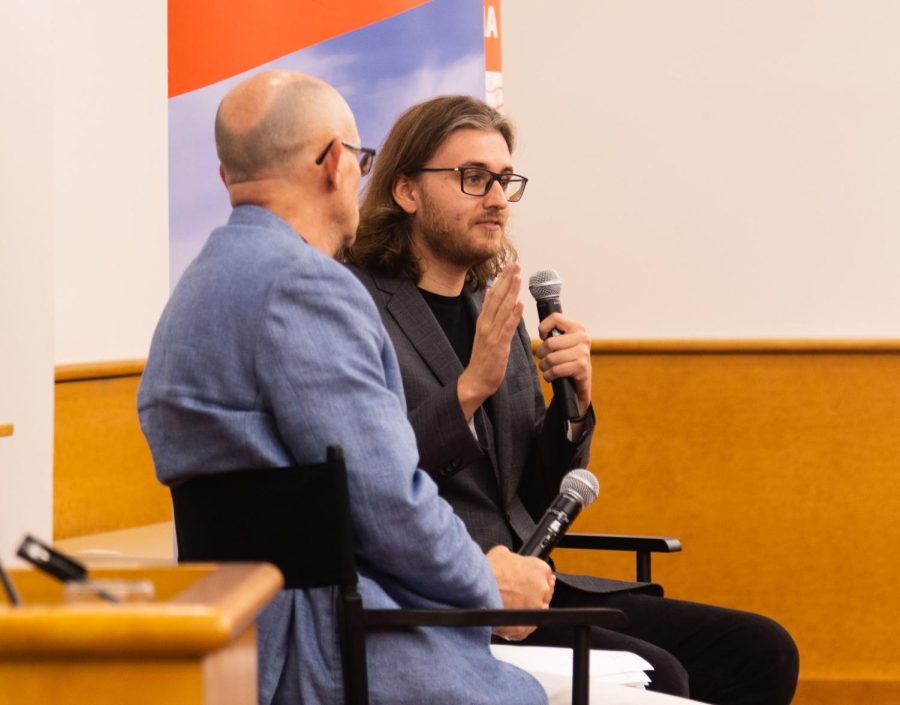Pulitzer-winning alum Eli Murray returns to campus for Q&A
Journalist Eli Murray sits next to Charles Ledford, associate professor of journalism, as he answers questions during a Q&A in the ACES Funk Library on Thursday. Earlier this year Murray won a Pulitzer Prize for Investigative Journalism.
Sep 15, 2022
An audience gathered Tuesday evening in the nearly filled Monsanto Multimedia Studio in the ACES Funk Library to hear from Eli Murray, a Pulitzer-winning journalist and Daily Illini alum. Murray talked about his career and gave a behind-the-scenes look into his award-winning story “Poisoned.”
The event, sponsored by the Richard and Leslie Frank Center for Leadership and Innovation in Media, was held in person and on Zoom.
Colleen King, clinical assistant professor in Media, began the event by introducing Murray to the audience. She explained that Murray graduated from the University in 2015 with a degree in journalism and then moved to Florida to intern with the Tampa Bay Times.
“Seven years later, Eli Murray would win the Pulitzer Prize,” King said.
Murray said his experience at The Daily Illini was “absolutely vital” in getting his internship at the Tampa Bay Times.
Get The Daily Illini in your inbox!
Charles “Stretch” Ledford, associate professor in Media, hosted the Q&A interview. The discussion focused on Murray’s Pulitzer-winning article.
“Poisoned” is a three-part series investigating a lead-smelting factory in Tampa, Fla. Murray, Corey Johnson and Rebecca Woolington worked together on the story.
The investigation found that the factory was knowingly exposing its workers to extremely high levels of airborne lead. Many workers, as well as a worker’s son, had health issues possibly tied to the lead levels at the factory.
Murray said that early in the reporting, the trio went door to door to talk to some workers. He recalled when the team visited a worker’s home and told the woman answering the door about their coverage of the lead smelter.
“Immediately, this woman burst into tears,” Murray said. “She recognized … that someone was interested in hearing her story, her personal struggles and something that she dealt with every day. She invited us in and … she showed us, on her counter, was a stack of medical records from her lead poisoned son. All of us, at that moment, realized … the gravity of the situation.”
Murray, Johnson and Woolington split up the work. Johnson did many of the interviews with workers, Murray did a lot of the data gathering and analysis and Woolington did the science reporting and wrote the final stories.
After the Q&A session, Murray made time for one-on-one conversations with students. When asked how it felt to return to the University to give a talk, Murray said that it was initially “nerve-wracking,” but he was grateful for the opportunity to come back.
King said she reached out to Murray for this event after he won the Pulitzer Prize because she thought he would be the perfect guest to bring to journalism students.
“He is both an inspiration as a journalism major, but also as someone who is close in age to students studying journalism today,” King said.
Murray gave advice to budding journalists, saying that everyone should work on being less self-conscious.
“You gotta quiet that part of you that is always talking about yourself,” Murray said. “That part of you thinking about, ‘Are people judging me? Am I not asking the right questions? Am I gonna look stupid?’ … is the part you gotta turn off.”
This Q&A was not Murray’s only event on Tuesday. Murray said he had a busy day.
He first met with Tracy Sulkin, dean of the College of Media, and then did a recorded interview with Ledford. He spoke to a JOUR 200: Introduction to Journalism class and had lunch with some journalism students.
Stephanie Wayda, junior in Media, was one of the students at this lunch. She said she appreciated that Murray talked about more than his Pulitzer Prize.
“We talked about normal life topics,” Wayda said. “He also gave a lot of really great advice for what the industry is actually like and what to expect.”
Wayda said she felt she bonded with Murray because they both transferred to the University after two years at community colleges. She said Murray was very open and willing to give advice.
“I don’t have a bad word to say at all … about him,” Wayda said.
Claire McDaniel, sophomore in Education, said the Q&A inspired her.
“I think it really encouraged me … as I’m going out into the world, to continue to have a curious mind, to ask questions, to continue to pursue the truth,” McDaniel said.






